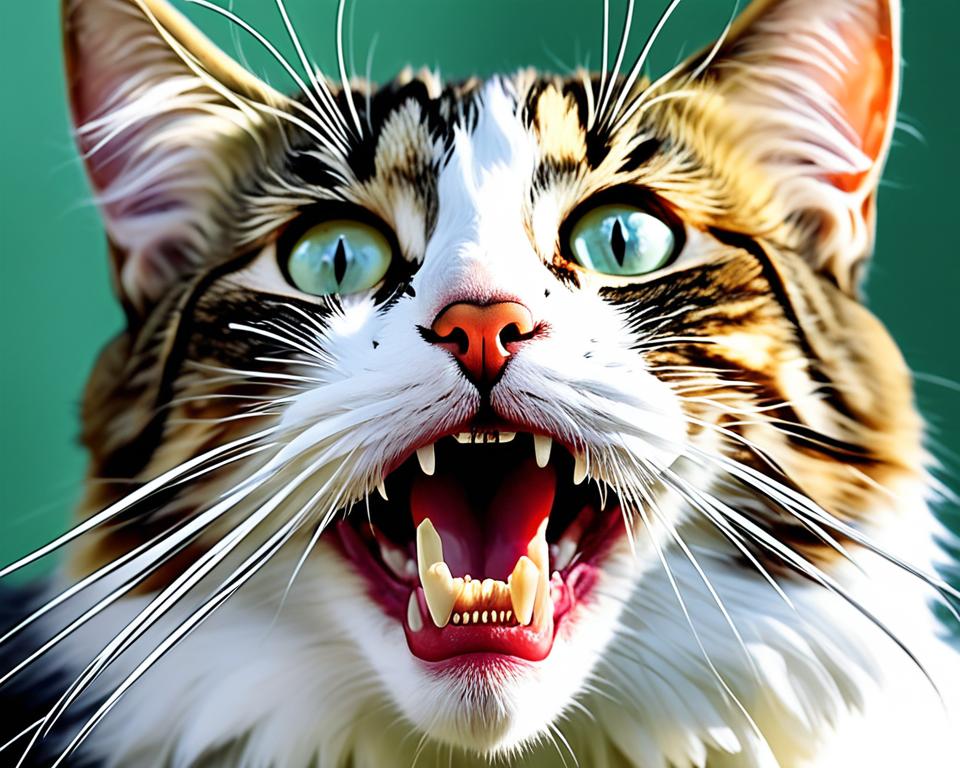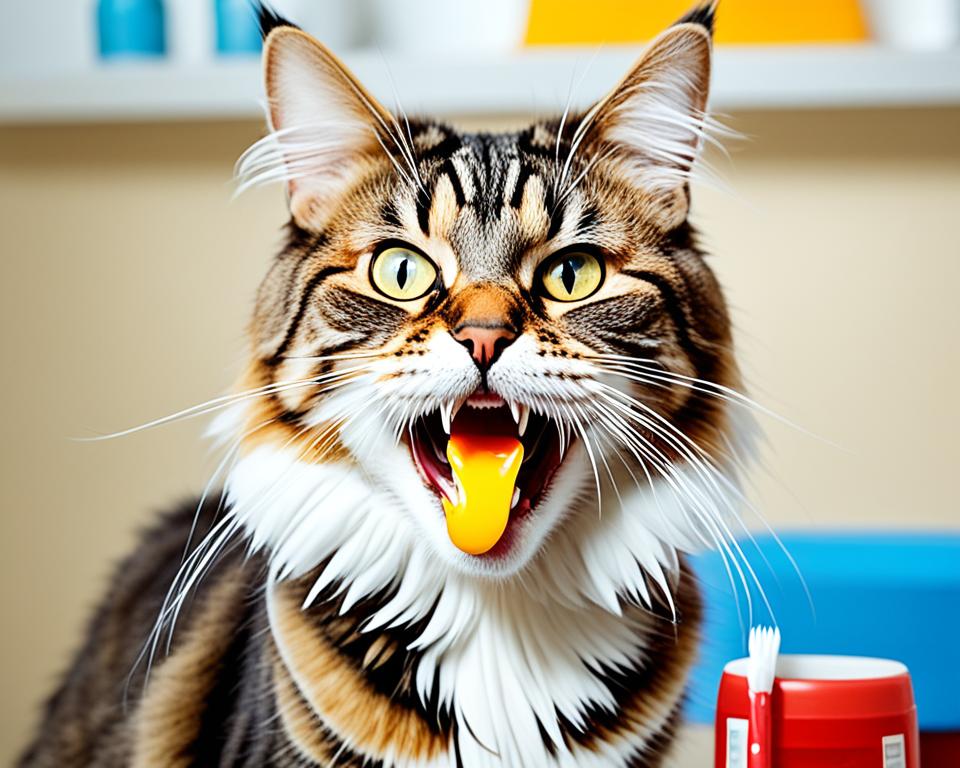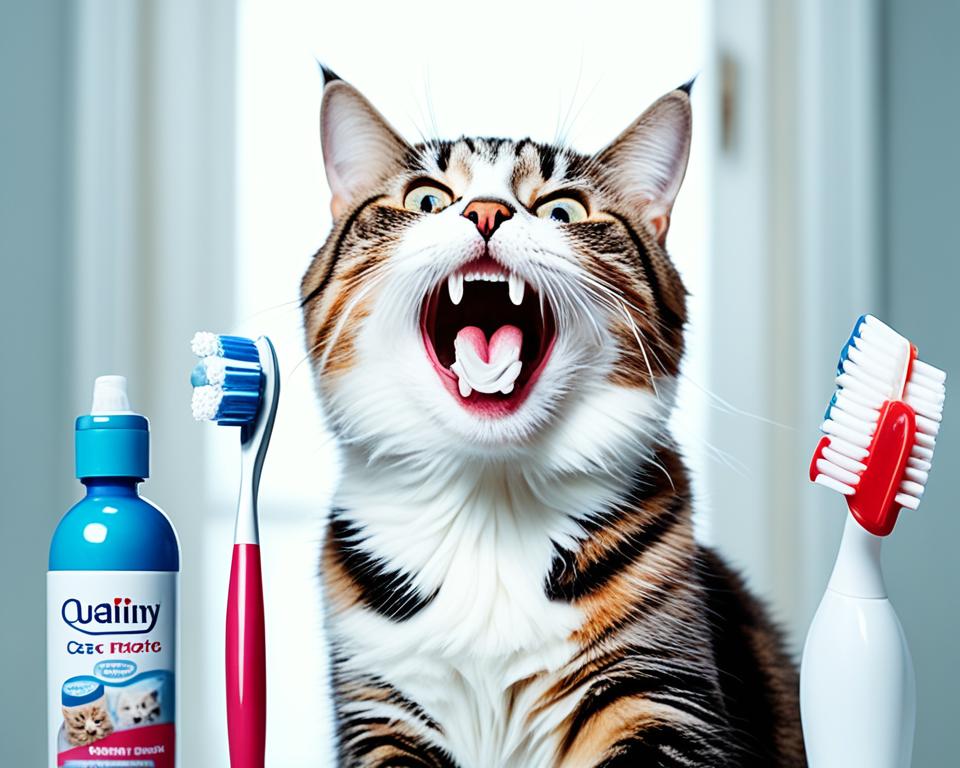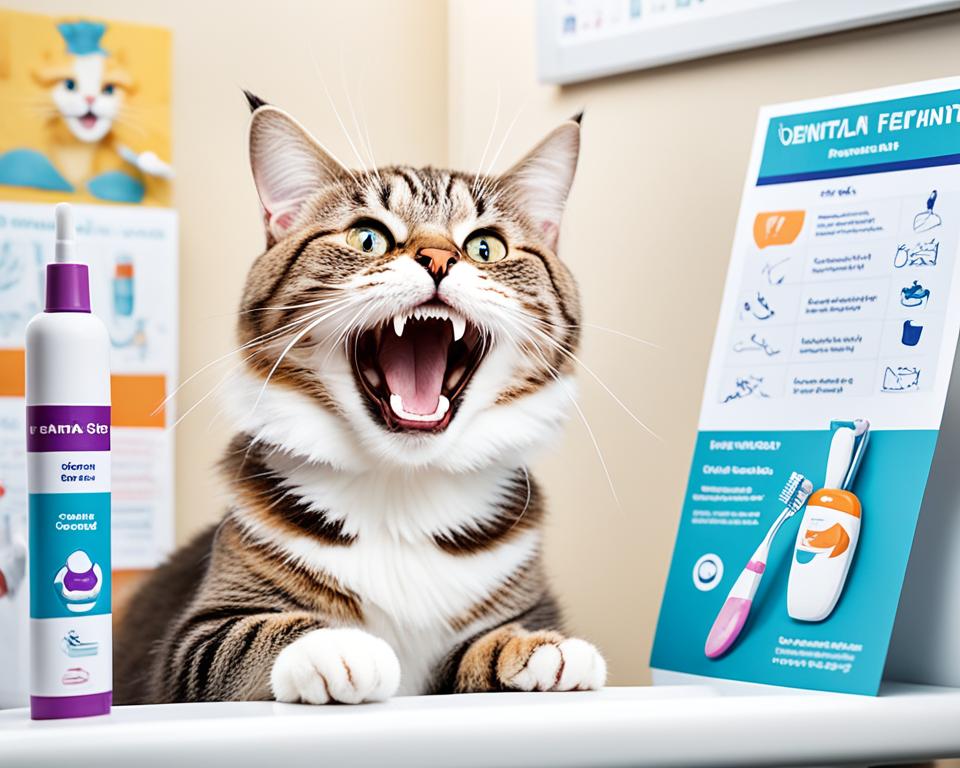Cat dental care is more important than many pet owners think. Did you know eight out of ten cats over three years old have teeth problems? That’s why I want to share how crucial feline dental health is. Regular check-ups and proper care can stop many issues, from bad breath to serious health problems.
Brushing your cat’s teeth might seem hard, but it’s key for their health. I suggest aiming for daily brushing, but even 2-3 times a week helps a lot. A healthy cat’s mouth should have clean, white teeth and pink gums. This shows your care is working.
Putting effort into cat dental care now can save you money and worry later. Professional cleanings are needed every 1-2 years and cost between $100 to $400. I’m here to help you keep your cat’s smile bright and healthy.
The Importance of Feline Dental Health

Feline dental health is very important for our furry friends. As a cat owner, I’ve seen how good dental care changes a cat’s life. It’s not just for clean teeth; it’s for their health overall.
Impact on Overall Well-being
Did you know 70-85% of pets over 2 have dental disease? This fact surprised me. Dental problems can hurt, making eating hard for cats. Good dental care means our cats can be happy and healthy.
Preventing Oral Diseases
Cat periodontal disease is a big worry. Regular dental care stops this and other mouth problems. I brush my cat’s teeth, use special dental foods, and get professional cleanings to prevent gingivitis.
Connection to Vital Organ Health
What I learned was shocking. Dental health affects other cat body parts too. Oral bacteria can go into the bloodstream, harming the heart, liver, or kidneys. This shows why good dental health is key.
| Dental Care Benefits | Impact on Cat Health |
|---|---|
| Reduced plaque and tartar | Decreased risk of periodontal disease |
| Fewer oral infections | Improved overall immune system |
| Prevention of bad breath | Enhanced quality of life |
| Decreased risk of systemic diseases | Better heart, liver, and kidney health |
By caring for our cats’ dental health, we protect their teeth and overall health. It’s a small effort that greatly benefits our feline friends.
Recognizing Signs of Dental Problems in Cats

Cat dental issues can be hard to spot. Cats hide pain well, making it tough to catch dental problems early. As a cat owner, I’ve learned to look for subtle signs of oral health issues.
Bad breath is often the first sign. If your cat’s breath smells bad, it could mean gingivitis or worse dental disease. I also watch for changes in how they eat. If my cat eats less, especially crunchy kibble, it might mean they’re in pain.
Here are some other signs I watch for:
- Drooling excessively
- Pawing at the mouth or face
- Visible redness or swelling of the gums
- Chewing on one side of the mouth
- Dropping food while eating
Did you know that 50% to 90% of cats show dental disease signs by age 4? That’s why I check my cat’s teeth often. Healthy cat teeth should be clean, white, and not chipped, with pink gums.
If I see any of these signs or think my cat has tooth decay, I see the vet right away. Early treatment is key for my cat’s oral health and overall health.
Cat Dental Care: Essential Practices for a Healthy Smile

Keeping your cat’s teeth clean is key for their health. By age three, 80% of cats show signs of dental problems. This shows why early dental care is vital.
Daily Brushing Techniques
Cat tooth brushing stops dental issues before they start. I pick a calm time and use a toothbrush made for cats. Brushing for 30 seconds on each side helps a lot. Over time, 90% of cat owners see their pets get used to brushing.
Choosing the Right Dental Products
There are many ways to keep your cat’s mouth healthy. Dental treats, water additives, and gels are good options. I’ve seen that dental treats can cut tartar by up to 60%.
| Product Type | Effectiveness | Ease of Use |
|---|---|---|
| Toothbrush and Paste | High | Moderate |
| Dental Treats | Moderate | High |
| Water Additives | Low to Moderate | Very High |
Alternative Dental Care Methods
For cats that don’t like brushing, there are other ways to help. Dental diets, chew toys, and even Q-tips or dental wipes can improve their oral health. It’s good to know that 75% of cats do better with dental formula kibble in their food.
Being consistent is important in cat dental care. Adding these steps to your routine can keep your cat’s smile healthy and happy for a long time.
Professional Dental Cleanings for Cats
Professional dental cleanings are key for your cat’s health. They help prevent dental diseases and keep your cat feeling good.
Frequency of Veterinary Dental Check-ups
Cats should see the dentist once a year. Older cats or those with dental problems might need to go more often. The American Veterinary Dental College says you can stop dental diseases with home care and yearly vet visits.
What to Expect During a Professional Cleaning
A cat dental cleaning takes 45 to 75 minutes. Your cat will be under anesthesia for a complete cleaning. Your vet will take x-rays, remove plaque and tartar, and fix any dental problems. Anesthesia for cats is safe and rarely causes problems.
Cost Considerations for Feline Dental Procedures
Professional cat dental cleanings cost between $100 to $400. More complex work, like tooth extraction, can be pricier. Some pet insurance covers dental cleanings, which can help with costs.
| Procedure | Average Cost | Frequency |
|---|---|---|
| Routine Dental Cleaning | $100 – $400 | Annually |
| Dental X-rays | $150 – $250 | As needed |
| Tooth Extraction | $300 – $1300 | As needed |
Investing in your cat’s dental care can save you money later. Regular cleanings and check-ups keep your cat happy and healthy.
Diet and Nutrition for Optimal Cat Dental Health
A cat’s diet is key to good dental health. The right diet can greatly help with feline oral health nutrition. Let’s look at some important facts and tips.
About 70% of cats over two years old have dental disease. This goes up to 85% for cats over five years old. We must act early to protect our cats’ teeth.
Many think dry food is enough for oral health. But studies show that special dental kibble diets help more than regular canned food. Yet, it’s not just about dry or wet food.
- Look for larger kibbles that encourage chewing
- Choose foods with the Veterinary Oral Health Council (VOHC) seal
- Consider a mix of wet and dry food for overall health
Cats are natural carnivores. Their diet should match this. Balancing dental health with nutrition is important. Talk to your vet for a plan that fits your cat.
“A healthy immune system contributes to a healthy mouth.”
Diet is important, but so are regular dental check-ups and home care. By combining a good diet with proper oral hygiene, we can keep our cats’ teeth healthy for a long time.
Natural Dental Care Aids: The Benefits of Cat Grass
Cat grass is a great way to help with your cat’s dental care. It’s easy to add to their daily routine and can really improve their oral health. Cat grass, like wheatgrass or oat grass, helps clean teeth by removing soft tartar as cats chew. It’s like nature’s toothbrush for our furry friends!
But cat grass isn’t just good for their teeth. It’s full of vitamins A and D, folic acid, and chlorophyll. These help with vision, immune health, and make their breath fresh. Chewing cat grass also stops them from eating harmful houseplants.
It’s simple to grow cat grass at home. Just plant the seeds and wait 3-7 days for sprouts. In two weeks, it will be tall enough for your cat to eat. A single crop can last up to three weeks, giving your cat a healthy snack. Just remember, cat grass should only be 10% of their daily calories.

